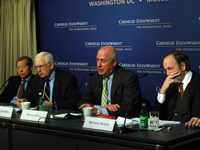Registration
You will receive an email confirming your registration.
U.S.-China relations experienced a great deal of turbulence in 2010, as a series of disagreements over the value of the renminbi, the status of territorial water claims in the South China Sea, and North Korean aggression unleashed harsh words from both sides. In advance of President Hu Jintao’s meeting with President Obama in Washington on January 19, Carnegie experts Douglas Paal, Michael Swaine, and Yukon Huang discussed key political, military, and economic issues facing the bilateral relationship. Ambassador J. Stapleton Roy from the Woodrow Wilson International Center for Scholars moderated the panel.
Sources of Conflict in Trade Relations
- Currency and Trade: The United States has demanded that Beijing allow the renminbi to appreciate in value, in order to reduce U.S. trade imbalance with China. This position, however, was perceived by China as giving inadequate recognition to China’s gradual shift to a more flexible currency system. Huang explained that, contrary to the widespread accusations about the slow pace of appreciation, China has already taken steps to gradually transform the renminbi into a more flexible currency and the structure of the global economy has been evolving in ways that would moderate trade imbalances. Ultimately, the Chinese government believes that the trade balance will be gradually resolved by these shifts, although many international observers argue that the pace has been too slow.
- Technology: China’s recent actions promoting indigenous innovation have fostered concerns that government subsidies and guidelines could potentially hurt U.S. technological innovation and its presence in China’s market. The Chinese government is eyeing green technology as the next crucial sector for boosting growth and Beijing has begun investing significantly in solar cells, high-efficiency batteries, and wind power technologies. This is contributing to U.S. fears about its competitiveness in an expanding and technology laden line of activity.
- Finances: Despite the fact that China is now the second largest economy in the world, the internationalization of the renminbi has not occurred. While the demand for free exchange of the renminbi is growing, Beijing remains unwilling to liberalize the currency and risk losing control of its value. However, trial use of the renminbi as an international currency in trade settlements has already begun. Huang argued that an internationalized renminbi presents a win-win situation for China and the United States, because it would lead to a gradual appreciation of the renminbi against the dollar, thereby reducing trade tensions. He predicted that internationalization of the renminbi will only accelerate in coming years.
Military Strategic Relations
Over the past year, mutual distrust has encouraged suspicions about the respective military capabilities of China and the United States. China has expressed concern regarding increased U.S. activity in Asia, while the United States perceives China as overly assertive and is concerned by some of Beijing’s efforts toward military modernization. Carnegie’s Michael Swaine stated that, in the absence of greater understanding and lessened distrust between the two militaries, the likelihood of future political-military crises, especially over territorial or maritime issues, could very well increase.
Following the meetings between U.S. Defense Secretary Robert Gates and Chinese generals held in Beijing this past week, both countries are resuming military-to-military dialogue. Swaine proposed three recommendations to further re-establish positive bilateral relations in the security realm:
- Continued senior civilian leadership commitment and direction to ensure sustained and deepening military-to-military contacts.
- Greater efforts to improve crisis management between the two powers.
- A more genuine strategic dialogue that addresses the broader political-military interests and objectives of both powers over the long term, within a changing dynamic, Asian, and global environment. Such a dialogue should occur on a semi-official level, involving both military and civilian specialists.
Hu Jintao’s Visit
Chinese President Hu Jintao’s state visit to Washington provides a crucial opportunity to develop a comprehensive, positive, and collaborative relationship by reducing frictions that have led to mutual distrust. Encouraging a collaborative rather than competitive relationship between the two nations will not only benefit China and the United States but also the rest of the world, said Roy.
